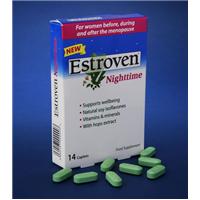
The menopause affects women differently but most will experience a variety of physical and emotional changes which can cause them to feel out of sorts, forgetful, tired and emotional something todays busy women could do without!
But now there is a natural product that will enable women to continue to live life to its full potential by supporting overall health and wellbeing, especially at night. Estroven Nighttime has been designed to provide gentle nutritional support during the period when a womans level of oestrogen, a key hormone, is out of balance or in decline.
During the menopause the levels of oestrogen – which have fluctuated during the perimenopause drop. This hormone imbalance may exacerbate a number of symptoms including night sweats, which then hampers restful sleep, interferes with sleep patterns and can result in overall tiredness and irritability.
Estroven Nighttime can be taken before, during and after menopause. Each caplet of Estroven Nighttime contains 40mg of natural isoflavones from a unique combination of soya and Japanese arrowroot. These phytoestrogens a plant compound which mimics the effect of oestrogen occur naturally in foods such as soya, lentils and other legumes. The average UK diet is low in these isoflavones, so using this supplement may help menopause sufferers during this period. In addition, the product contains essential vitamins and minerals to help maintain general well being , as well as relaxing ingredients such as magnesium, Dateseed extract and Hops extract to offer support when most needed at night.
Hops are a well-renowned herb that has been used for many years for its natural mild sedative and relaxing properties. Date seed extract is used for its calming effects and magnesium is an important mineral in the body to maintain healthy muscles by helping them to relax.
Health & Well-Being Consultant, Liz Tucker says; The symptoms of menopause can mess up your moods, make you feel exhausted and out of control. Symptom severity and time scale can vary greatly and it is this uncertainty that many women dread. Fortunately there are some simple natural steps every woman can take that could help reduce and stabilize negative menopausal effects.
“Research² indicates that an improved diet and specific supplements can help, in particular increasing your intake of phytoestrogens. These are found in plant based foods such as soya and supplements such as Estroven Nighttime which have been specifically designed to alleviate the symptoms of night sweats and sleep problems.”
So, if you are looking for a product which supports wellbeing during menopause and helps you relax at night, then try Estroven Nighttime. Available in packs of 14 caplets, priced at £6.85. Estroven Nighttime is available from Boots, Tesco, Holland & Barrett and independent pharmacies and healthfood stores. It will sit alongside the original Estroven product which aids womens overall wellbeing by day, and is available in packs of 30 caplets and retails at £14.68.
For more information on Estroven and Estroven Nighttime please contact the Estroven Careline on 0844 800 9348 (UK telephone number)
More Information
¹ Estroven Nighttime contains: Vitamin D, Vitamin B6, Calcium, Magnesium, Isoflavones, Date Seed Extract and Hops Extract
² Full scientific data at


